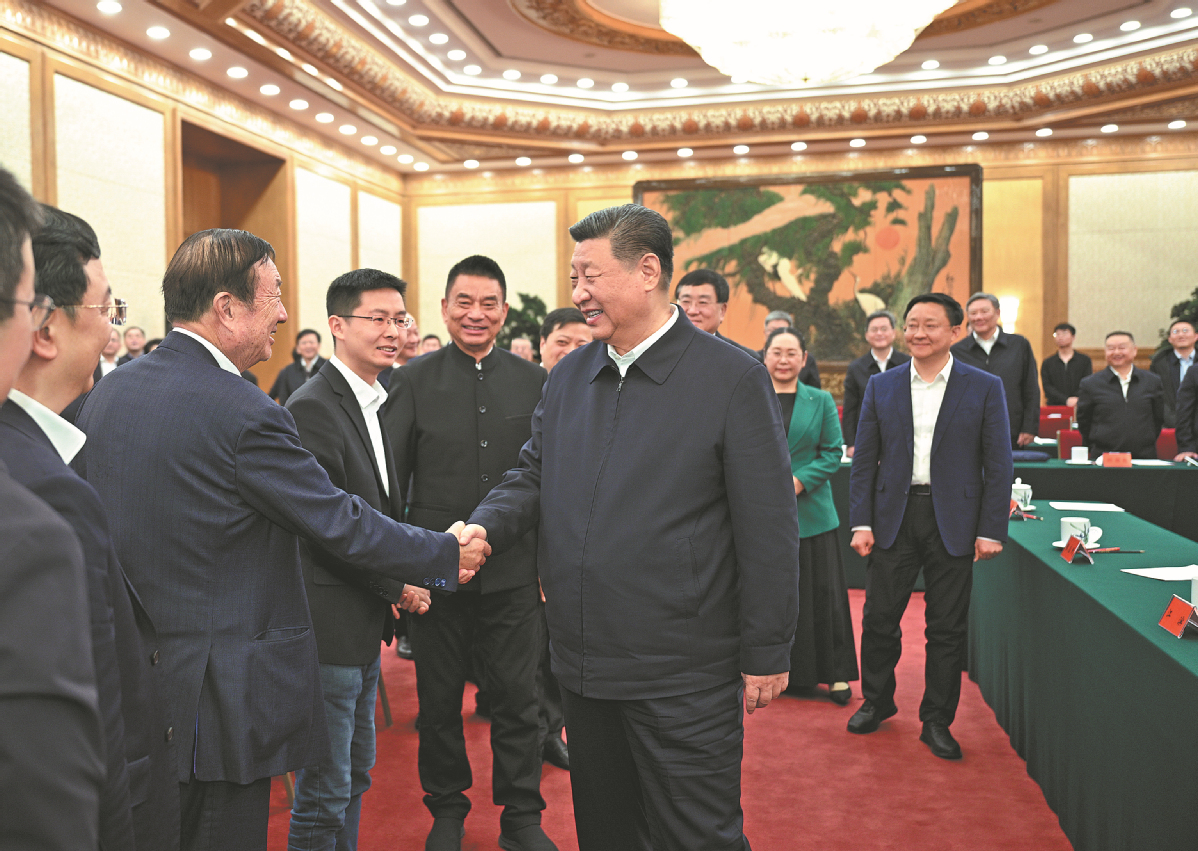
President Xi Jinping shakes hands with Ren Zhengfei, founder and CEO of tech giant Huawei Technologies, at a symposium on private enterprises on Monday in Beijing. LI XUEREN / XINHUA
President Xi Jinping has reiterated China's commitment to boosting the private sector through concrete efforts to implement supportive policies and measures.
Xi, who is also general secretary of the Communist Party of China Central Committee and chairman of the Central Military Commission, made the remarks on Monday in Beijing at a symposium on private enterprises. The gathering of high-profile participants came years after the previous such symposium was presided over by Xi in 2018.
Among the attendees were Huawei's Ren Zhengfei, BYD's Wang Chuanfu, New Hope's Liu Yonghao, Will Semiconductor's Yu Renrong, Unitree Robotics' Wang Xingxing and Xiaomi's Lei Jun. The six business leaders put forward their opinions and advice on the development of the private sector.
Speaking to a roomful of senior officials and private entrepreneurs, Xi said the government's basic principles and policies concerning the development of the private economy have been incorporated into the system of socialism with Chinese characteristics and will consistently be upheld and fulfilled.
"They cannot and will not be changed," he said, noting that obstacles should be removed in order to facilitate private enterprises' equal access to factors of production and market opportunities in accordance with the law.
Xi said that as the world's second-largest economy further reforms and opens up, the enormous market with a population of over 1.4 billion will bring new opportunities for the greater development of private enterprises.
"On the new journey in the new era, the prospects for the development of the private economy are broad and promising. It is a prime time for private enterprises and entrepreneurs to give full play to their capabilities," he said.
As of the end of September last year, China had over 55 million registered private companies, accounting for 92.3 percent of all businesses. They contribute more than half of the country's tax revenue, over 60 percent of GDP and over 80 percent of urban employment.
Regarding the difficulties and challenges currently facing the private sector's development, Xi said that these have generally emerged during the process of reform and development and industrial transformation.
"They are partial rather than general, temporary rather than long-term, and surmountable rather than unsolvable," Xi said, stressing the need to stay focused on growth, maintain confidence in development and face up to the challenges with optimism.
Since the 18th National Congress of the CPC in 2012, the CPC Central Committee and the State Council have rolled out a series of policies and measures to spur the growth of the private sector.
China is also moving closer to its first basic legislation specifically focused on the development of the private sector, as the draft law was submitted to the Standing Committee of the 14th National People's Congress for deliberation in December.
During the symposium, Xi also called for continuous efforts to see that the competitive areas of infrastructure are open to market entities in a fair manner, to resolve the difficulties private enterprises face in accessing affordable financing, and to resolve overdue payments to private enterprises.
The government will earnestly protect the legitimate rights and interests of private businesses and entrepreneurs in accordance with the law, Xi said.
But he noted that China is a socialist country ruled by law, and no type of illegal activities by enterprises, despite their form of ownership, can avoid investigation and punishment.
Xi also stressed the role of private enterprises in advancing China's broader goals in terms of technological innovation, promoting rural vitalization and improving people's well-being. He urged entrepreneurs to focus on high-quality development, invest in their main businesses, strengthen their capacities for innovation, and increase their core competitiveness.
It is hoped that the vast number of private enterprises and entrepreneurs will take the lead in promoting common prosperity, thus making new and greater contributions to advancing Chinese modernization, he said.
mojingxi@chinadaily.com.cn